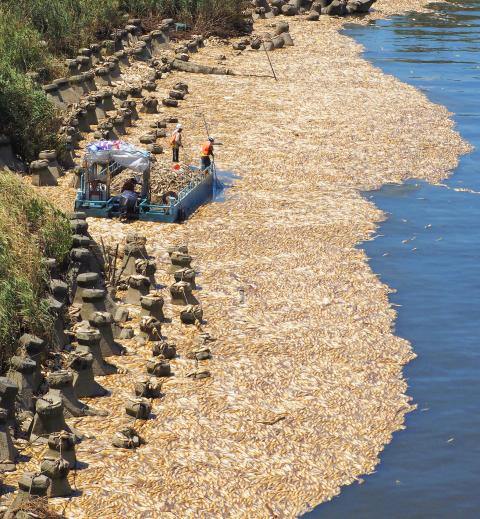Large numbers of dead fish have washed up on the shores of the Keelung River from Zhongshan Bridge to Dazhi Bridge, probably because of consecutive days of high temperatures, the Taipei City Government said.
The city government said it expected to finish clearing the dead fish from the river today.
The Taipei Environmental Protection Bureau said that the amount of dissolved oxygen in the water near the dead fish was 3.5 milligrams per liter, which is about four to five times lower than normal.

Photo: EPA
The water temperature was 30.3oC, far higher than the average high temperature of 28.1oC in recent years, the bureau said.
The pH of the river was 7.3 which is normal, the bureau said, adding that despite the mass fish deaths the tilapia population in the river was alive and well.
“We suspect that the cause of mass death in fish is not due to contamination, but high temperatures,” the bureau said.
The bureau said it set up netting and floating blocks near the Bailing and Zhongshan bridges to prevent the dead fish washing downriver and was working with the Water Resources Agency to remove the dead fish.
The bureau said it could not give an accurate estimate on the total number of fish killed.
The bureau said that similar incidents have occurred in Yilan County’s Dongshan River (冬山河), Taoyuan’s Laojie Creek (老街溪), the Bitan area (碧潭) in New Taipei City’s Xindian District (新店) and in Xizhi District (汐止).
Taipei Public Works Department official Yu Pai-sung (游百崧) said that the greatest concentration of dead fish was near a river junction.
The department yesterday sent out three boats to help clear the fish, and at least one returned before noon fully laden, Yu said.
The department sent out an additional two boats yesterday afternoon to expedite the operation, Yu said.

Taiwan is stepping up plans to create self-sufficient supply chains for combat drones and increase foreign orders from the US to counter China’s numerical superiority, a defense official said on Saturday. Commenting on condition of anonymity, the official said the nation’s armed forces are in agreement with US Admiral Samuel Paparo’s assessment that Taiwan’s military must be prepared to turn the nation’s waters into a “hellscape” for the Chinese People’s Liberation Army (PLA). Paparo, the commander of the US Indo-Pacific Command, reiterated the concept during a Congressional hearing in Washington on Wednesday. He first coined the term in a security conference last

Prosecutors today declined to say who was questioned regarding alleged forgery on petitions to recall Democratic Progressive Party (DPP) legislators, after Chinese-language media earlier reported that members of the Chinese Nationalist Party (KMT) Youth League were brought in for questioning. The Ministry of Justice Investigation Bureau confirmed that two people had been questioned, but did not disclose any further information about the ongoing investigation. KMT Youth League members Lee Hsiao-liang (李孝亮) and Liu Szu-yin (劉思吟) — who are leading the effort to recall DPP caucus chief executive Rosalia Wu (吳思瑤) and Legislator Wu Pei-yi (吳沛憶) — both posted on Facebook saying: “I

Sung Chien-liang (宋建樑), who led efforts to recall Democratic Progressive Party (DPP) Legislator Lee Kun-cheng (李坤城), was released on bail of NT$80,000 today amid outcry over his decision to wear a Nazi armband to questioning the night before. Sung arrived at the New Taipei District Prosecutors’ Office for questioning in a recall petition forgery case last night wearing a red armband bearing a swastika, carrying a copy of Adolf Hitler’s Mein Kampf and giving a Nazi salute. Sung left the building at 1:15am without the armband and covering the book with his coat. Lee said today that this is a serious

The Ministry of Economic Affairs has fined Taobao NT$1.2 million (US$36,912) for advertisements that exceed its approved business scope, requiring the Chinese e-commerce platform to make corrections in the first half of this year or its license may be revoked. Lawmakers have called for stricter enforcement of Chinese e-commerce platforms and measures to prevent China from laundering its goods through Taiwan in response to US President Donald Trump’s heavy tariffs on China. The Legislative Yuan’s Finance Committee met today to discuss policies to prevent China from dumping goods in Taiwan, inviting government agencies to report. Democratic Progressive Party Legislator Kuo Kuo-wen (郭國文) said